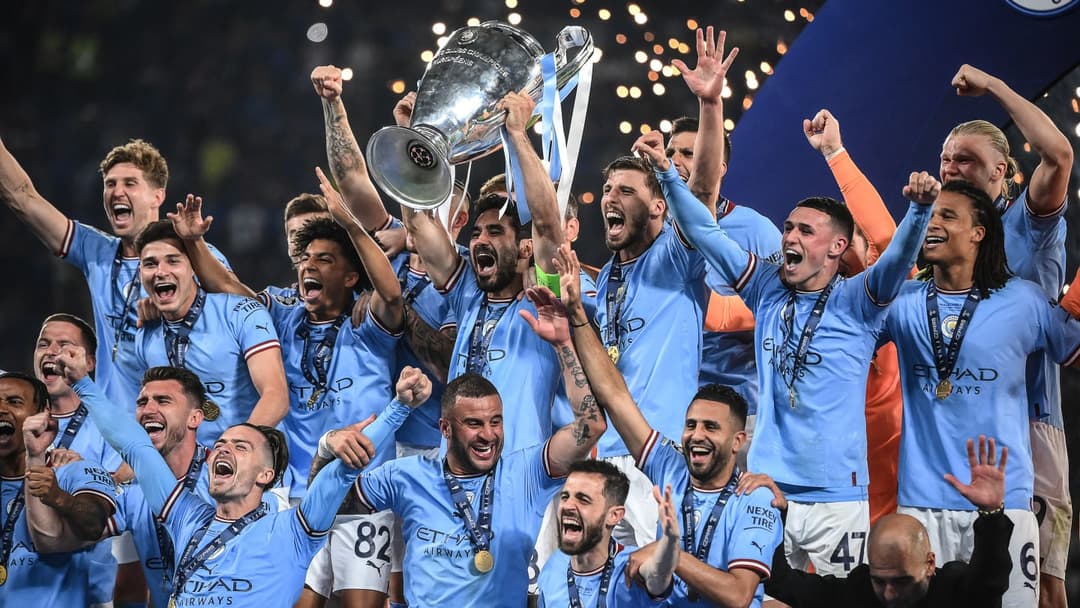The Fight for the 2024-2025 Premier League Title: Can Anyone Catch Liverpool?
Like a freight train gathering momentum down the tracks, Liverpool's 12-point advantage in the Premier League table tells only part of their dominance story. You're witnessing a team that's conceded just 18 goals while scoring 40 across their first 17 matches.
Their possession metrics and expected goals differential dwarf the competition. As Arsenal and others desperately chase, the question isn't just whether they can catch Liverpool, but how the pursuit might reshape their seasons altogether.
Key Takeaways
- Liverpool's 12-point lead with nine games left makes them strong favorites to win the title.
- Arsenal must win all nine remaining matches and hope Liverpool drops more than 13 points.
- Bookmakers give Arsenal only a 3.85 percent chance of catching Liverpool in the title race.
- Liverpool's tactical advantages include aggressive pressing and league-best counter-attacking (13 goals).
- Nottingham Forest and Chelsea have emerged as surprising third and fourth place contenders respectively.
Liverpool's Dominant Campaign: Breaking Down the Numbers
Numbers don't lie, and Liverpool's incredible 2024/2025 campaign has been built on statistical excellence across the pitch.
With 2.38 goals per match and only 0.93 conceded, they've overwhelmed opponents at both ends.
Mohamed Salah's 27 goals and 17 assists have been instrumental, while their 57.3 percent possession rate demonstrates commanding control in midfield.
The Reds' dominant position sees them 12 points ahead of second-placed Arsenal with just nine games remaining in the season.
Arsenal's Mathematical Path to Glory: What Needs to Happen
While Arsenal's title hopes appear to be fading, a mathematical pathway to Premier League glory still exists—though it's exceedingly narrow.
To secure the title, Arsenal must win all nine remaining matches, reaching 76 points, while hoping Liverpool drops more than 13 points from their final nine games.
With a 12-point gap and Liverpool averaging 2.37 PPG, bookmakers give Arsenal just 3.85 percent chance. In fact, Premier League odds suggest that Arsenal’s hurdle is far steeper than most fans realize, given their recent struggles to maintain winning streaks longer than three games.
Key Fixtures That Will Decide the Title Race
As the Premier League season enters its decisive phase, a handful of high-stakes fixtures will ultimately determine the champion.
Liverpool's last gauntlet—at Chelsea, Brighton, and home to Arsenal—represents their most challenging stretch.
The April Merseyside derby adds further complexity, particularly as Everton meets both title contenders that month.
Arsenal's journey is complicated by their tough upcoming schedule and a critical match at Anfield in May.
The Tactical Battle: Why Liverpool Has the Edge
Liverpool's tactical evolution under Slot has transformed them into a formidable title contender with distinct advantages over their rivals.
Their aggressive man-oriented pressing disrupts opposition buildup while their counter-attacking prowess (league-leading 13 goals) exploits defensive gaps.
The Van Dijk-Konaté partnership dominates aerially, and tactical flexibility through midfield rotations allows them to adapt against any opposition strategy. Liverpool's ability to shift between compact shapes and man-for-man marking enables them to maintain strong defensive integrity throughout matches.
The Dark Horses: Can Nottingham Forest or Chelsea Spring a Surprise?
Beyond the obvious title challengers, two unexpected contenders have emerged in this season's Premier League race. Nottingham Forest sits third with 54 points, just 4 points behind Arsenal, while Chelsea holds fourth with 49 points.
Forest's impressive record includes 16 wins and victories against top teams, while Chelsea's +16 goal difference highlights their attacking threat despite inconsistent form. Forest's recent form under Nuno Espirito Santo has been particularly impressive with no losses in their last three Premier League matches.
Team Bonding and Off-Pitch Camaraderie
Behind every successful squad stands a tight-knit group of players who genuinely trust one another. Shared meals, lighthearted locker-room banter, and occasional group outings help build friendships that transcend the pitch. When individuals connect on a deeper level, they move as one unit during critical match moments.
Off-pitch activities also allow newcomers to adapt smoothly, bridging cultural gaps and personal differences. By fostering a supportive environment, each member feels valued and motivated to excel. The sense of unity created off the field can often be the decisive factor in clutch situations, galvanizing a team’s spirit when faced with adversity.
The Psychological Edge: Pressure and Mindset
Premier League battles are as much mental as they are physical. Players constantly juggle high expectations and the fear of letting their teammates or fans down. Successful teams cope by embracing pressure rather than avoiding it. They refine pre-match routines, practice visualization techniques, and rely on sports psychologists or senior squad members for emotional support.
Understanding the importance of mental resilience also helps managers pick the right words during heated halftime team talks. Even the smallest positive reinforcement can strengthen resolve, while one lapse in focus can change a game’s course. Ultimately, staying calm under intense scrutiny often separates true contenders from the rest.
The Role of Rivalries in Shaping the Season
Fierce rivalries ignite a level of passion and competition unlike anything else in football. Matches between historic rivals, even when standings suggest a mismatch, can produce stunning results simply because of the intensity on the field. The anticipation fuels fans, players, and managers alike, adding extra motivation to every challenge and tackle.
Rivalries also capture the attention of neutrals, who tune in to witness the drama unfold. These encounters become more than mere fixtures; they serve as psychological chess matches, laden with longstanding pride and bragging rights. In many cases, a single rivalry match can reshape the momentum of an entire season.
The Final Act of the Premier League Chase
As you watch Liverpool's march toward the title, you're witnessing perhaps the season's great irony: the club that once specialized in dramatic collapses now leads with mechanical efficiency. The numbers don't lie—their 2.7 points per match dwarfs Arsenal's 2.3.
While mathematically several teams remain in contention, statistically, this race is already running its predictable course. The trophy's destination seems frustratingly inevitable.


